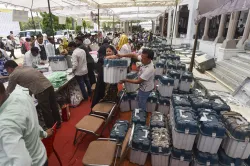Lok Sabha Elections 2024: What is Form 17C and controversy linked with voter turnout data? | EXPLAINED
The poll panel has said that there is no legal mandate to provide Form 17C to any person other than the candidate or his agent.

The Supreme Court on Friday refused an NGO's plea to issue the Election Commission directions to upload polling station-wise voter turnout data on its website during the Lok Sabha polls, saying a "hands-off approach" needs to be adopted during the elections. A vacation bench of Justices Dipankar Datta and Satish Chandra Sharma said it cannot issue any such directions at the moment as five phases of polling have concluded and two remain and it would be difficult for the poll panel to mobilise manpower.
The ADR has filed an interim application in its 2019 PIL seeking directions to the poll panel that "scanned legible copies of Form 17C Part-I (Account of Votes Recorded)" of all polling stations be uploaded immediately after the polls. In its affidavit, the poll panel opposed the NGO's demand, stating that it will "vitiate" the electoral space and cause "chaos" in the poll machinery in the midst of the general elections. The poll panel has said that there is no legal mandate to provide Form 17C to any person other than the candidate or his agent.
What is Form 17C?
- Under the Conduct of Elections Rules, 1961, Form 17C records the votes cast at each polling station across the country.
- This information includes polling station code number and name, number of voters (Form 17A), number of voters who decided not to vote, number of voters who were not allowed to vote, number of votes recorded ( data from EVMs), number of votes rejected, reasons for rejection of votes, number of votes accepted, data about postal ballots.
- This data is recorded by the polling officials and checked by the presiding officer of that booth. The second part of Form 17C is also important. This is related to the day of counting of votes.
- It contains the record of votes for each candidate. It is recorded on the day of counting. It contains information about the name of the candidate and the votes received. This shows whether the total votes counted from that booth is the same as the total votes polled or not. This arrangement is to avoid manipulation of votes by any party. This data is recorded by the observer of the counting centre. Each candidate (or his/her representative) has to sign the form, which is checked by the Returning Officer.
What's the controversy
- Questions have been raised after the Election Commission released the voting figures of the first and second phase.
- There was a delay of 10 days in releasing the data of the first phase. The delivery of the next three phases was delayed by four days each. The data for the fifth phase was released on Thursday, three days after voting.
- Opposition leaders demanded the Election Commission to release this data within 48 hours of voting.
- Congress has said that some questions related to real time and final figures of voting remain unanswered and demanded answer from the Election Commission.
- After the voting, Congress expressed the apprehensions of the party regarding the increase in the voting percentage figures. Claimed that there is a huge difference between the real-time data on the day of voting and the data released thereafter.
- This difference is 1.07 crores, which is unprecedented in the elections so far. Never in history has there been such a significant difference between the day of voting and the final figures released thereafter. How did it grow?

